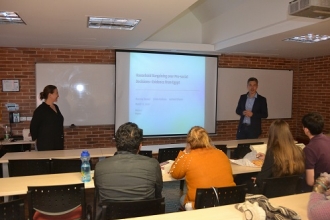Gender Equity during Covid-19
After publishing " In the wake of COVID-19, academia needs new solutions to ensure gender equity", St. Mary's College of Maryland created a website addressing gender equity in academia. Women in…
After publishing " In the wake of COVID-19, academia needs new solutions to ensure gender equity", St. Mary's College of Maryland created a website addressing gender equity in academia. Women in…
"How to avoid gender bias in reference letters" by the University of Arizona, Commission on the status of women When writing a letter of reference for a student, the University of Arizona has a great…

EfD’s very own Collaborative Programs: WinEED and SETI co-organized the virtual workshop “Energy access through a gender lens” to work at the nexus of energy poverty and gender. The Sustainable Energy…
Written by: Thomas Klug & Marc Jeuland
About the Workshop
Using micro-level data from the 2013 nationally-representative GENDA survey on approximately 1,200 own-account and micro enterprises, we examine firm performance and business growth between men and women entrepreneurs in Ghana. Using OLS and multinomial logit (MNL) regression techniques, we find differential effects and constraints for men and women-owned businesses: men generally perform better than women, controlling for a host of characteristics. We find that among women-operated firms, locating a business at home has negative performance implications.
Existing research shows that access to employment and earnings appears to have ambiguous effects on women’s bargaining power and subsequent empowerment. This study explores the effect of higher relative earnings by women on the likelihood of social empowerment and examines to what extent the relationship is moderated by husbands’ education levels. The 2008 and 2014 rounds of the Ghana Demographic and Health Survey are used for the analyses, and a Probit regression model, with interaction effects, is employed as a base model.
One-in-four women in Nigeria has experienced some type of spousal violence in her life. The present study uses relative occupational positions of women as a proxy for bargaining power and examines this as a potential risk (or protective) factor for intimate partner abuse in Nigeria; a perspective as yet unexplored by the existing literature. Using the nationally-representative 2013 Nigeria Demographic and Health Survey (NDHS) and a multinomial logit regression model, I examine the association between occupations and IPV.

EfD Colombia organized together with CODS (Center for the Sustainable Development Goals) the first environmental economics seminar of the year 2020 at Universidad de los Andes. The seminar was held on…